Rising commercial vacancies and a declining population indicate that Haltom City is lagging in this area.
HALTOM CITY, TX, September 17, 2024 /24-7PressRelease/ — For years, the members of the Haltom United Business Alliance (HUBA) have been asking the city to adopt strategies to spur revitalization in the beleaguered south and central areas of the city. Since there’s no public money available, they’ve suggested code and policy changes to make these areas more attractive to private investors and small businesses. They’ve even compiled a list of well-researched ideas that have had a positive impact in other cities.
The non-profit group Strong Towns is often cited by HUBA when it comes to the issues at hand. Strong Towns helps American cities adopt common-sense reforms to achieve financial stability and create neighborhoods that are “safe, livable, and inviting.” They offer workshops, in-depth courses, articles, podcasts, and how-to-guides on a variety of pertinent topics. They also share “favorite links” to other organization and publications when they hit on related issues.
In a shared article about a photographer who captures “vanishing” buildings in his home state of Georgia, we learn about a historic opera house that was once considered the center of its community. Like many of the vacant buildings in the older areas of Haltom City, the opera house has been closed down and unused for years. Why? Because in order to stay open the owner would have had to comply with new codes that, among other things, required building a fire escape and installing seating that was permanently attached to the floor. The upgrades were so costly at the time that the building’s owner decided to just let it stay closed.
When it comes to the older areas of Haltom City, a similar issue is at play. Although seats and fire escapes may not be a problem, requirements to install sprinklers, add parking spaces (even if unneeded), and make other costly changes are significant barriers to progress. According to HUBA Communications Director Joe Palmer, “Although work-arounds might be possible, the process is time-consuming and costly. Even worse, it’s risky because an investor won’t know if approval is possible until they’ve gone through a process that takes months and sometimes years. More often than not, they’ll just decide to go elsewhere, leaving Haltom City with a vacant building that sits unused for years.”
Ron Sturgeon, one of the founding members of HUBA, recalls how it took him over a year to win approval for a low-cost events center and almost another year to complete improvements to get open. He comments, “What small business can wait two years to open?” He adds, “DFW has over 1,000 new residents daily, while Haltom City’s population is declining. Shame on our leadership for not making a plan to improve the declining corridors. They want to point to their successes on the north side of town, while the vacancy rate on the main corridor is close to 30% and appears to be increasing. Without a plan for the south and central portions of the city, there can be no improvement.”
As reflected in the shared Strong Towns link, “If any city is looking to bolster their economic activity, a great first step is to evaluate barriers and figure out how to make the bar to entry lower.” HUBA would like to see code reform in an overlay district that would encompass Denton Highway, Carson, NE 28th Street, and Belknap. Said Palmer, “Studies have shown that small businesses are the driver of revitalization in inner city areas. Haltom City needs to compete and make the process easier for investors, whether they want to renovate a property, change its use, or open a small business.” Sturgeon has offered the city up to $100,000 to commission a plan from Strong Towns, but the city wasn’t interested. Sturgeon wants his legacy to be that he improved and turned around the exodus of small businesses and turned around the decline in population in Haltom City. He adds, “None of this is possible without a plan, and our leadership is totally against creating one, I assume for fear of upsetting the status quo.”
Additionally, HUBA would like to see Haltom City become known as “the friendliest city in Tarrant County for small businesses” in order to promote revitalization of the inner city areas. That simply won’t happen if prospective investors continue to be turned off by zoning obstacles, rigid code requirements, unnecessary parking mandates, and time-consuming red tape.
About Haltom United Business Alliance
Haltom United Business Alliance (HUBA) wants to give members of Haltom City’s business community an advocate and to keep those businesses informed about issues that affect them. They want to make sure Haltom City is business friendly and nurtures small business growth, including automotive businesses in the industrial districts, and bring more restaurants including breweries and eventually a major grocery store to the city. New businesses and growth in existing businesses will create a stronger tax base which will allow the city to pay its first responders wages that are competitive with surrounding cities while improving Haltom City’s facilities and infrastructure. HUBA believes that the southern and central parts of the city need a revitalization plan, to prevent further degradation in those areas, and wants that to happen before the inner-city experiences increased crime and more blight. As retail and office uses are in decline, it’s more critical than ever to attract new businesses. They believe that such a plan requires a strong relationship and support of the business community. Anyone who owns a business in Haltom City is eligible to join HUBA. Dues are $20 annually or $50 for a lifetime membership, and membership is 100% confidential. To join, contact Joe Palmer at (682) 310-0591 or by email at HUBAgrp@gmail.com. Visit the group’s Facebook at Haltom United Business Alliance.
About Strong Towns
Strong Towns, a 501(c)(3) nonprofit media advocacy organization, is dedicated to help American cities become financially strong and resilient. As written in their mission statement, “We advocate for cities of all sizes to be safe, livable, and inviting. We work to elevate local government to be the highest level of collaboration for people working together in a place, not merely the lowest level in a hierarchy of governments.” An interview with group founder Charles Marohn that is said to be a great way to introduce someone new to Strong Towns can be viewed on the website of Thesis Driven as part of their Thesis Driven Leader Series. Check it out if you get the chance: Author Charles Marohn on How to Fix Cities.
—
For the original version of this press release, please visit 24-7PressRelease.com here





